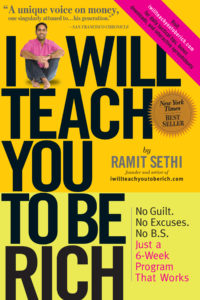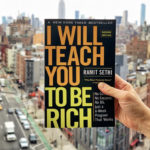It’s no secret that I love Tina Fey. My favorite chapter in her book Bossypants was devoted entirely to her father, Don. She writes, “My dad has visited me at work over the years, and I’ve noticed that powerful men react to him in a weird way. They ‘stand down.’ The first time Lorne Michaels met my dad, he said afterward, ‘Your father is impressive.’”
Well, Lorne, I think it’s high time you met my dad, Bruce. (This is all going to tie into credit cards, I promise.)
 That’s Bruce in the center. He kindled that fire.
That’s Bruce in the center. He kindled that fire.
Because of his natural tendency to be boss, Bruce sometimes does dad-ly things. For instance: One evening in high school, a young man (now a good friend) came to pick me up for a date. (We were going to see Finding Nemo.) I made sure to still be upstairs when this young man arrived, so that I could make a grand entrance. Well, years later I found out that before I got downstairs, my dad actually pulled this young man aside and interrogated him à la dads on sitcoms: He made my date confirm that he would have me home by 10. He may have actually uttered the words, “What are your intentions regarding my daughter?”
So you understand that my dad is just looking out for my best interest when he says, “Credit card companies are out to get you. They’re just looking to get your money.” Naturally, my dad is right. In fact, credit card companies are so notorious for nickle-and-dimeing their customers that the federal government has stepped in on numerous occasions, enacting laws to reign in the companies’ evil ways.
Nevertheless, if you want to save lots of money over the long term, you need good credit. I learned this as I embarked upon Week 1 (Optimize Your Credit Cards) of the 6-week program to financial literacy outlined in Ramit Sethi’s I Will Teach You to Be Rich. 
“Our largest purchases are almost always made on credit,” Ramit writes, “and people with good credit save tens of thousands of dollars on their purchases. Credit has a far greater impact on your finances than saving a few dollars a day on a cup of coffee.”
But, Ramit, can it be? Is this really true?
Yes, he says: “If you have good credit, it makes you less risky to lenders, meaning they can offer a better interest rate on loans.” And though I’m not looking to pay for a wedding or buy a house anytime soon, I know that, someday, I might do both. And you say all I have to do to save thousands of dollars in future interest is pay my bill on time each month, not carry a balance, and get my APR lowered and all fees waived? No problem. After all: I’ve never had a credit card.
Believe it, folks. I have managed to live out three post-graduate years without the aid of a credit card. As far as living within my means goes, I’ve made Bruce proud. However, such a scenario does not bode well for aforementioned hypothetical Big Expenses. Of course, perhaps this hypothetical Mr. Right and I will decide to elope. And perhaps we’ll raise our family in a (fabulous, sprawling) rent-controlled New York City apartment, instead of in a house with a mortgage. Regardless: There will still be costs. Furniture. Vacations. Baby strollers. We might need that loan. And in order to get it, I’m going to need that credit.
Which is why I headed to my bank, where Ramit told me I’d find the simplest credit cards for beginners like me. I signed up. I plan to make my dad even prouder: I’m gonna pay that bill in full every month with my future Tahitian vacation in mind. Here’s to you, Dad.






No Comments